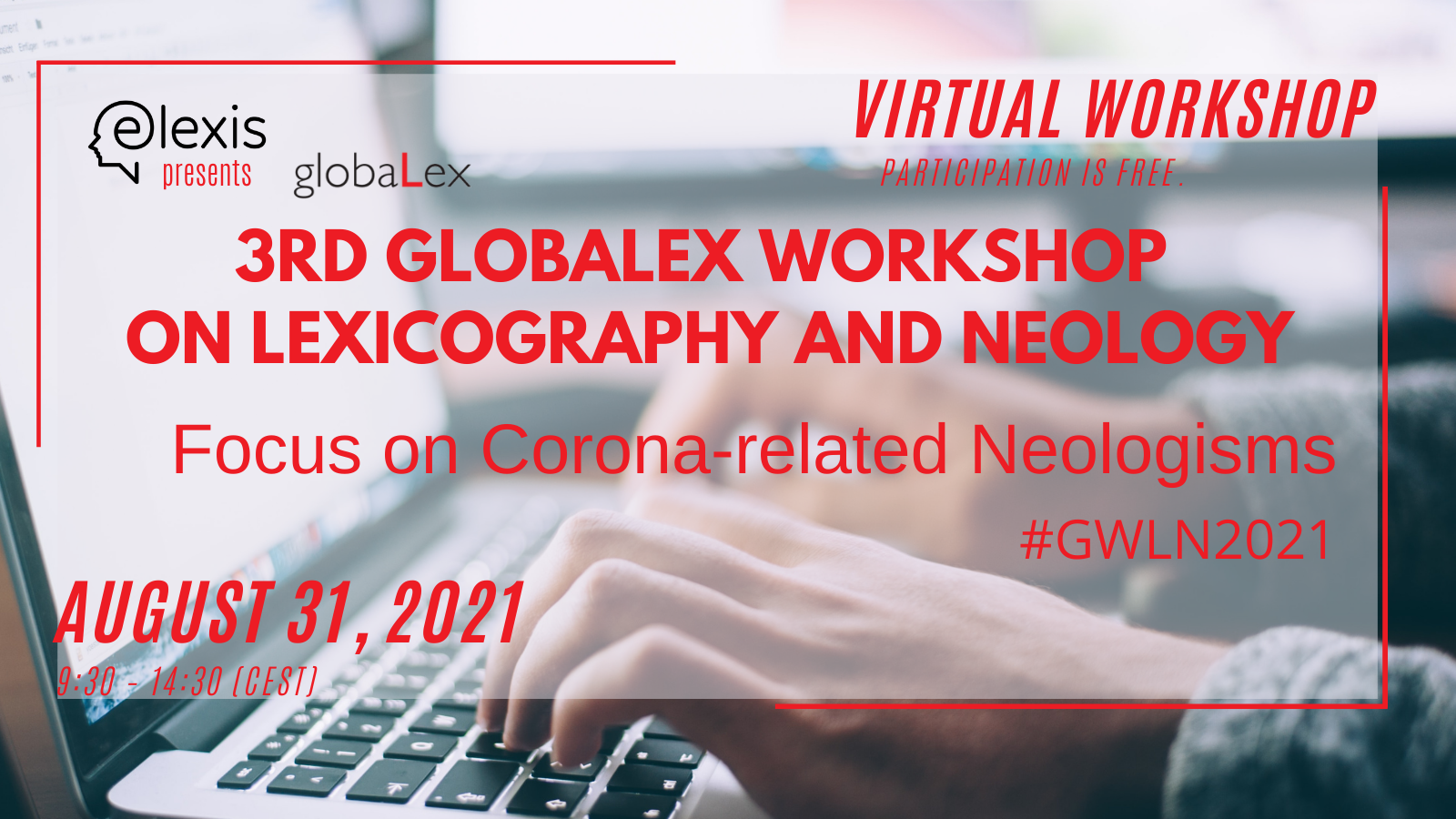3rd GLOBALEX Workshop on Lexicography & Neology: Focus on Corona-related Neologisms
- Date
- 31.8.2021, 9.30 – 14.30 (CEST)
- Location
- Virtual
Please register by August 15th:
gwln2021@ids-mannheim.de
ELEXIS is co-organising the third iteration of Globalex Workshop on Lexicography and Neology (GWLN) that will be held online in conjunction with the AUSTRALEX 2021 conference, on August 31.
You are invited to attend GWLN3, the participation is free:
Please register by August 15 to receive the contact details: gwln2021@ids-mannheim.de.
The focus of GWLN-3 is on neologisms arising in relation to the Corona pandemic. The 12 papers in the workshop cover issues related to the detection of such neologisms and their lexicographic processing and representation, offering cross-world views on COVID-19-driven neologisms for eight languages.
GWLN 2021 is supported by Globalex – the Global Alliance for Lexicography and follows the two GWLN events organized in conjunction with the DSNA (2019) and EURALEX (2020) conferences.
The organizers are Annette Klosa-Kückelhaus (IDS, Leibniz-Institute of the German Language) and Ilan Kernerman (K Dictionaries).
The program is as follows:
|
9:30-9:40
|
OPENING
|
Annette Klosa-Kückelhaus, Ilan Kernerman
|
||
|
9:40-10:00
|
Neologisms in New Zealand Sign Language: A case study of Covid-19 pandemic-related signs
|
Mireille Vale, Rachel McKee, Sara P. Alexander
|
New Zealand
|
NZSL |
| 10:00-10:20 | Neoterm or neologism? A closer look at the determinologisation process | Rute Costa, Raquel Silva, Margarida Ramos, Ana Salgado, Sara Carvalho, Bruno Almeida | Portugal | EN, PT |
| 10:20-10:40 | Social semantic variation of English Covid-related neologisms | Quirin Würschinger, Barbara McGillivray, Hans-Jörg Schmid | Germany and UK | EN |
| 10:40-11:00 | Wiktionary’s revision history for uncovering lexical innovations related to topical events | Franck Sajous | France | EN, FR |
| 11:00-11:15 | BREAK | |||
| 11:15-11:35 | The Oxford English Dictionary and the language of Covid-19 | Danica Salazar, Kate Wild | UK | EN |
| 11:35-11:55 | Usage analysis of Korean neologisms related to COVID-19 and their description in Korean lexicography | Hyeonah Kang, Jinsan An, Kilim Nam | Korea | KO |
| 11:55-12:15 | Corona-related neologisms: A challenge for Croatian standardology and lexicography | Milica Mihaljević, Lana Hudeček, Kristian Lewis | Croatia | HR |
| 12:15-12:35 | How the COVID-19 emergency is changing the Hungarian language. Building a Hungarian/Italian/English glossary of the COVID-19 pandemic | Judit Papp | Italy | EN, HU, IT |
| 12:35-12:50 | BREAK | |||
| 12:50-13:10 | The neologisms of the COVID-19 pandemic in European Portuguese: From media to dictionary | Sílvia Barbosa, Susana Duarte Martins | Portugal | PT |
| 13:10-13:30 | Lexicographic detection and representation of Spanish neologisms in the covid pandemic | Pedro J. Bueno, Judit Freixa | Spain | ES |
| 13:30-13:50 | Lexicographic representation and productivity of Spanish neological resources during the COVID-19 pandemic | Andreína Adelstein, Victoria de los Ángeles Boschiroli | Argentina | ES |
| 13:50-14:10 | Spanish lexical creativity in the covid pandemic: Neologisms and occasionalisms | Magdalena Coll, Mario Barité | Uruguay | ES |
| 14:10-14:30 | DISCUSSION & WRAP-UP | Annette Klosa-Kückelhaus, Ilan Kernerman |
About the workshop:





